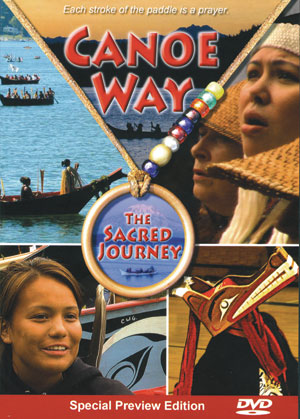 |
Canku Ota
|
 |
|
(Many Paths)
|
||
|
An Online Newsletter
Celebrating Native America
|
||
|
April 1, 2010 - Volume
8 Number 4
|
||
|
|
||
|
'Every Paddle Is
A Prayer'
|
||
|
by Clare Jensen - Tacoma
(WA) Weekly
|
||
|
Movie showcases significance of canoe journey in coastal culture, healing Over the years, canoe journeys have become an integral part of many coastal tribes' way of life and tradition. But it was not always like that. For more than a century, cultural practices, language and spiritual expression were suffocated in Native American culture.
"'Canoe Way' takes you full circle," Satiacum said. "It gently guides you through the meaning and the purpose of the canoe way, and that it's really about healing." Through interviews, the film covers the background of the canoe journeys, starting with the first modern-day canoe journey – the Paddle To Seattle in 1989. The film includes footage from the 2007 Journey to Lummi and the 2008 Journey to Cowichan. "We talked to the people down in the southern Puget Sound where the traditions are still really deep. We got the heavy hitters…the ones from the beginning of the journey, the middle and the ones who are keeping it going today," Satiacum remarked. The DVD includes an additional hour of bonus interviews with Harold Belmont, Marilyn Wandrey, Chief Frank Nelson, Squaxin Island Canoe Family and Philip H. Red Eagle. "Canoe Way" was completed in July 2009, and the film was showcased Nov. 10 at the 34th annual American Indian Film Festival in San Francisco. A special screening and discussion of "Canoe Way" will be held at the Tahoma Unitarian Universalist Congregation April 2. Satiacum said he hopes the film will help create an awareness of how far tribal nations have come in reclaiming their cultural rights and regaining traditions. "The canoe journeys have woken up the culture," he said. "We are in this generation of healing and we thought 'we've got to capture this somehow."' "We're using the technology we have today to record it, to help preserve these traditions and cultural practices for our children and our children's children." Throughout "Canoe Way" viewers get an understanding of the positive impact and spiritual healing the journeys have on individuals and entire tribes. First-hand accounts of canoers' personal experiences, and the impact of the cultural revival on youth and in turn, future generations, becomes apparent as you see the commitment of the canoers to leading healthy, focused lifestyles. "We started with a handful of canoes back in 1989," Satiacum said. "Now it's almost out of hand." At the most recent canoe journey to Suquamish in 2009, more than 100 canoes, 1,000 pullers and thousands of spectators participated in the cultural event, and those numbers continue to grow. "We're doing good things out here, and we wanted to show that," Satiacum said of the Pacific Northwest Indian tribes. "It's a phenomenon, this canoe journey way, and the bottom line is about healing." For more information about "Canoe Way," visit http://www.canoeway.com or http://www.cedarmedia.org. A free screening of Canoe Way as part of the First Friday Film Forum will be held at 6:30 p.m., April 2 at Tahoma Unitarian Universalist Congregation, 1115 S. 56th St. |
|
|
||
|
|
||
| Canku Ota is a free Newsletter celebrating Native America, its traditions and accomplishments . We do not provide subscriber or visitor names to anyone. Some articles presented in Canku Ota may contain copyright material. We have received appropriate permissions for republishing any articles. Material appearing here is distributed without profit or monetary gain to those who have expressed an interest. This is in accordance with Title 17 U.S.C. Section 107. | ||
|
Canku Ota is a copyright ©
2000, 2001, 2002, 2003, 2004, 2005, 2006, 2007, 2008, 2009, 2010
of Vicki Barry and Paul Barry.
|
||
 |
 |
|
|
The "Canku
Ota - A Newsletter Celebrating Native America" web site and
its design is the
|
||
|
Copyright ©
1999, 2000, 2001, 2002, 2003, 2004, 2005,
2006, 2007, 2008, 2009, 2010
of Paul C. Barry.
|
||
|
All Rights Reserved.
|
||
 "Canoe
Way," a new documentary by Puyallup tribal member Robert Satiacum
and filmmaker Mark Celletti, showcases the significance of the cultural
revival in Northwest Indian culture, and the growing tradition of
annual canoe journeys throughout the Puget Sound and beyond.
"Canoe
Way," a new documentary by Puyallup tribal member Robert Satiacum
and filmmaker Mark Celletti, showcases the significance of the cultural
revival in Northwest Indian culture, and the growing tradition of
annual canoe journeys throughout the Puget Sound and beyond.